![]()
TO EACH HIS OWN
GOD’S COUNTRY
MY FATHER once pointed out to me the announcement above a local movie house that was showing a double bill:
TO EACH HIS OWN
GOD’S COUNTRY
This wry juxtaposition could be taken as a comment on both the city of Prague and the ever-ambivalent Franz Kafka. Those who live imaginatively in his inner city immerse themselves in it so deeply that to hear any two of its vicarious inhabitants argue about its essence is to witness a conflict over the nature of the human spirit.
But at a later date, you might find that both their strongly held positions had totally altered. Max Brod, Kafka’s lifelong friend and biographer, asserts that every time you open a Kafka novel, it is a different book. If you have indeed absorbed him into your psyche, this is not surprising: our feelings about ourselves alter constantly with time and experience.
-0-
My first experience of Prague was in January 1991, just over a year a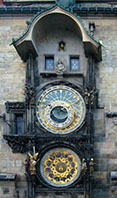 fter the Velvet Revolution. Mary and I took a short three-city tour which included days in Prague, Budapest and Vienna. In Prague, the tourists had already discovered its unique attractions, but in midwinter they were blessedly thin on the ground. I remember standing with our little group in front of the Astronomical Clock; I remember the Old Square as almost totally deserted. On the hour, we had the bells and the moving figures to ourselves. (Was that really the case? As with Kafka, what is important is not what is real but what you remember.)
fter the Velvet Revolution. Mary and I took a short three-city tour which included days in Prague, Budapest and Vienna. In Prague, the tourists had already discovered its unique attractions, but in midwinter they were blessedly thin on the ground. I remember standing with our little group in front of the Astronomical Clock; I remember the Old Square as almost totally deserted. On the hour, we had the bells and the moving figures to ourselves. (Was that really the case? As with Kafka, what is important is not what is real but what you remember.)
In those days of acute shortages, the food was indeed something to write home about, but not in favourable terms. Our one memorable meal, though not for its 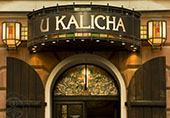 cuisine, was in U Kalicha (The Goblet), the old bar/restaurant made famous by its association with Jaroslav Hašek’s Good Soldier Švejk, one of Europe’s first and greatest anti-war novels. (Joseph Heller credits it with having inspired his Catch-22.) This rollicking institution was also noteworthy for the enthusiasm with which its inebriated patrons pinched the waitresses’ bottoms, all in the spirit of the Good Soldier himself. Its website used to tell its story.
cuisine, was in U Kalicha (The Goblet), the old bar/restaurant made famous by its association with Jaroslav Hašek’s Good Soldier Švejk, one of Europe’s first and greatest anti-war novels. (Joseph Heller credits it with having inspired his Catch-22.) This rollicking institution was also noteworthy for the enthusiasm with which its inebriated patrons pinched the waitresses’ bottoms, all in the spirit of the Good Soldier himself. Its website used to tell its story.
Our tour guide did not take us into the back streets of the Old Town. 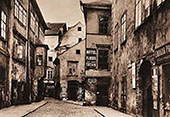 Though undamaged by bombs, its varied and distinguished buildings had suffered from many years of neglect, their once varied and colorful facades as uniformly black as London before its wholesale steam cleaning. Almost a quarter century later, all the photos told us, we would be greeted with colors so varied and so vibrant that there could not have been a moment in the city’s history when they all looked so new! Prague’s status as a UNESCO World Heritage Site had brought its restoration a host of individual and collective sponsors.
Though undamaged by bombs, its varied and distinguished buildings had suffered from many years of neglect, their once varied and colorful facades as uniformly black as London before its wholesale steam cleaning. Almost a quarter century later, all the photos told us, we would be greeted with colors so varied and so vibrant that there could not have been a moment in the city’s history when they all looked so new! Prague’s status as a UNESCO World Heritage Site had brought its restoration a host of individual and collective sponsors.
-0-
Our early start had brought us to our hotel by midday. Mary needed a bit of a nap so I set out on my own. Our splendid old hotel, the Best Western Meteor Plaza, was just outside the Powder Gate in what had once been the old town’s east wall, so it was a short stroll to Celetna, one of the oldest and most famous streets in Prague.
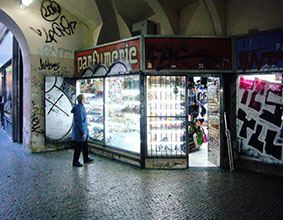
At this moment, a Kafka-like perversity assumed control of my brain. Walking along under the colonnade on the street’s southern edge, I saw only the shops full of tourist tat and the shabby walls overlaid with graffiti. Coming out at last into the Old Town Square, my ears were assailed by a small jazz band, not playing very well. They needed amplification to be heard above the noisy tourists who were paying attention to little but themselves.
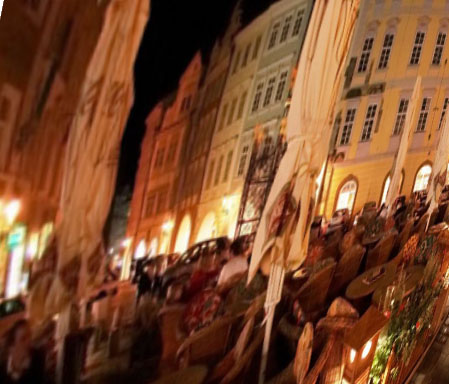 Covering one side of the great square was a sprawl of restaurant tables, at whose far end was a row of still more tourist stalls and shabby little fast food joints. Around the corner to the left was a dense crowd, some of them gathered in bunches listening to their tour guides. I finally got close enough to see that they were all massed around the Astronomical Clock, that engineering marvel whose operation we had watched and listened to so many years ago in solitary silence. So this was the price of world fame and tourist Meccadom!
Covering one side of the great square was a sprawl of restaurant tables, at whose far end was a row of still more tourist stalls and shabby little fast food joints. Around the corner to the left was a dense crowd, some of them gathered in bunches listening to their tour guides. I finally got close enough to see that they were all massed around the Astronomical Clock, that engineering marvel whose operation we had watched and listened to so many years ago in solitary silence. So this was the price of world fame and tourist Meccadom!
-0-
I hurried back to our hotel, where Mary was just waking up. Indignantly I told her of my disappointment and disillusion. Prague was the most overrated tourist designation city I’d ever experienced.
—Could we go for a walk?
—Sure. Everything is nearby, you can see for yourself.
I led her along the same short route.
—This isn’t so bad. In fact it’s quite lovely. Look over there!
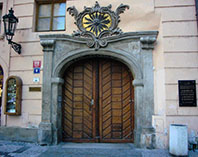 Mary pointed to a distinguished building across the street that I hadn’t noticed an hour before; I’d had eyes only for the graff
Mary pointed to a distinguished building across the street that I hadn’t noticed an hour before; I’d had eyes only for the graff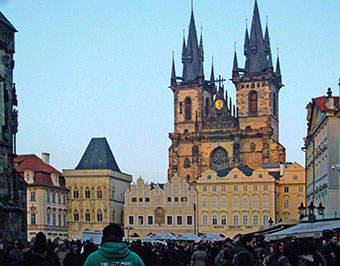 iti. We reached the Old Town Square. Turning around and looking back, there was the stunning rococo façade of the Kinsky Palace, surmounted by the gothic steeples of the Church of Our Lady before Tyn. Surely it was the brain of some stranger that an hour ago had written off this magnificent square as mere tourist tat. Was it post-election depression after the disastrous American midterms? No matter; Kafka would have understood!
iti. We reached the Old Town Square. Turning around and looking back, there was the stunning rococo façade of the Kinsky Palace, surmounted by the gothic steeples of the Church of Our Lady before Tyn. Surely it was the brain of some stranger that an hour ago had written off this magnificent square as mere tourist tat. Was it post-election depression after the disastrous American midterms? No matter; Kafka would have understood!